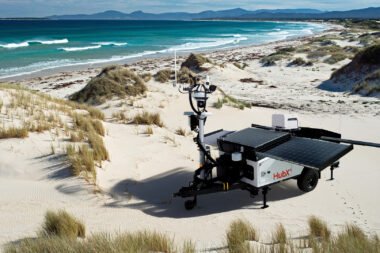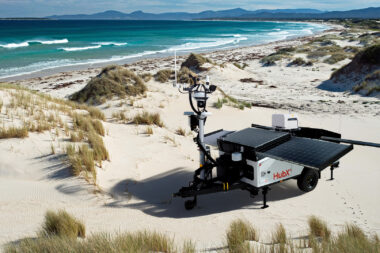Darwin Tuesday 19 November: Gender and Disaster Australia’s (GADAus) Lessons in Disaster (LID) training is coming to Darwin on Thursday 21 November, providing NT first responders with an opportunity to learn how they can help prevent the family violence and men’s self-harm and suicide that can increase with disasters.
“It's great to see NT Fire and Emergency Services expanding their disaster preparedness now with our Lessons in Disaster training, and developing a greater understanding of how gendered responses and expectations are exacerbated in disasters. This will help improve disaster management in what can often be a chaotic response period,” says Lead Trainer Rachael Mackay.
“We deliver online and in-person training to disaster response personnel, emergency management providers, health and community services, disaster-prone communities, and a range of other groups,” says Ms Mackay.
GADAus trainer and firefighter with 35 years of experience, Steve O’Malley, says firefighters don’t want to be heroes, they want communities to prepare better next time and heed warnings to leave.
“One of the best ways to prepare is to know how individuals respond to pressure, regardless of their gender, and let people play to their strengths.
“Not all men want to be the protector, and it doesn’t serve everyone’s best interests if women are expected to put their needs last,” Mr O’Malley says.
Ms Mackay says GADAus training can help communities and first responders free themselves and others from gendered expectations, so they can more effectively respond to disasters and take care of each other in the aftermath.
LID training includes listening to the stories of men and women who have lived through some of our worst disasters, like the Black Saturday bushfires, to get a better understanding of what happens to people under pressure and how to plan for the best outcomes for everyone.
Since mid-2022 GADAus has trained over 1000 participants from the emergency services sector, local, state and federal government, health organisations, disaster response agencies, and communities to challenge rigid gender stereotypes and improve disaster management and survival.
As one participant says:
“Building a deeper understanding of the complex relationships between gender and the impacts of an emergency response to a disaster has helped me to identify not only where the sector can improve, but where I as a male first responder can improve by becoming more aware and more empathetic to these issues.
“The more I learn about the mythology perpetuated around emergency worker masculinity in society, the more I realise there are opportunities to address this - big boys do cry”.
Cliff, Lessons in Disaster participant from Victoria
GADAus also offers a Train-the-trainer program to upskill facilitators to deliver the LID training within their organisations or communities. This embeds the training in communities and organisations on an ongoing basis so that the benefits can continue into the future.
“Women, men and LGBTIQA+ people experience disaster differently. Often it is men who are expected to protect and provide (even when it’s not possible). Women are expected to nurture and care for others, sometimes at the expense of their own safety and wellbeing, and LGBTIQA+ people’s needs are rarely considered,” says Ms Mackay.
”With climate-related disasters increasing in frequency and ferocity, it is more critical than ever to understand the impact of gendered expectations in disasters. Now is the time to act, because disaster is no excuse for family violence.”
“Applying a gendered lens at each stage of disaster, from prevention and planning to response and recovery will allow for more effective emergency management. The result will be stronger and more inclusive communities in and after disasters,” Ms Mackay concludes.
Safer evacuation centres
GADAus also advises Councils on how to plan safer Evacuation and Relief Centres and recently received additional funding through the Commonwealth Disaster Ready Grants, to work with every council in Victoria, and disaster high risk councils in NSW, to help make evacuation centres safer for everyone.
GADAus has developed a package to guide and support Local Government and Emergency Management personnel to ensure safety for those sheltering in Evacuation and Relief Centres. The advice is premised on their GEM Guidelines which were informed by approximately 500 emergency management personnel.
GADAus’ LID training responds to Recommendation 22.5 of the Royal Commission to develop nationally consistent, pre-agreed recovery programs including those that address social needs such as domestic violence.
GADAus received a Commonwealth grant under the National Plan to End Violence Against Women and their Children 2022-2032 to train 1000 responders over four years, and has exceeded that target already in 18 months.
The success of the LID program has sparked further interest among local councils, emergency services, and NGOs who recognise the need to reduce the risks of domestic violence during and after disasters. GADAus continues to expand its outreach and offer tailored sessions.
For upcoming training opportunities or to join the next LID cohort, visit the GADAus website or contact Melesa Osborne M: 0425 823 064 E: [email protected].
For media and more information contact:
Linda Apps M: 0433 999 017 E: [email protected]
Carolin Wenzel M: 0417 668 957 E: [email protected]
Melesa Osborne M: 0425 823 064 E: [email protected]
If you or someone you know is impacted by sexual assault, domestic or family violence, call 1800RESPECT on 1800 737 732 or visit www.1800RESPECT.org.au.
Key Facts:
Domestic violence and men's self harm increase during and after disasters
Northern Territory Fire and Emergency Services are training to help deal with it this Thursday.
GADAus bases its Lessons in Disaster (LID) training on research from the 2009 bushfires.
GADAus has trained more than 1000 participants since mid-2022.
About us:
GADAus Holds a vision for an Australian society that recognises and acts to prevent the harms of rigid gendered stereotypes in disasters.
Contact details:
For media and more information contact:
Linda Apps M: 0433 999 017 E: [email protected]
Carolin Wenzel M: 0417 668 957 E: [email protected]
Melesa Osborne M: 0425 823 064 E: [email protected]


